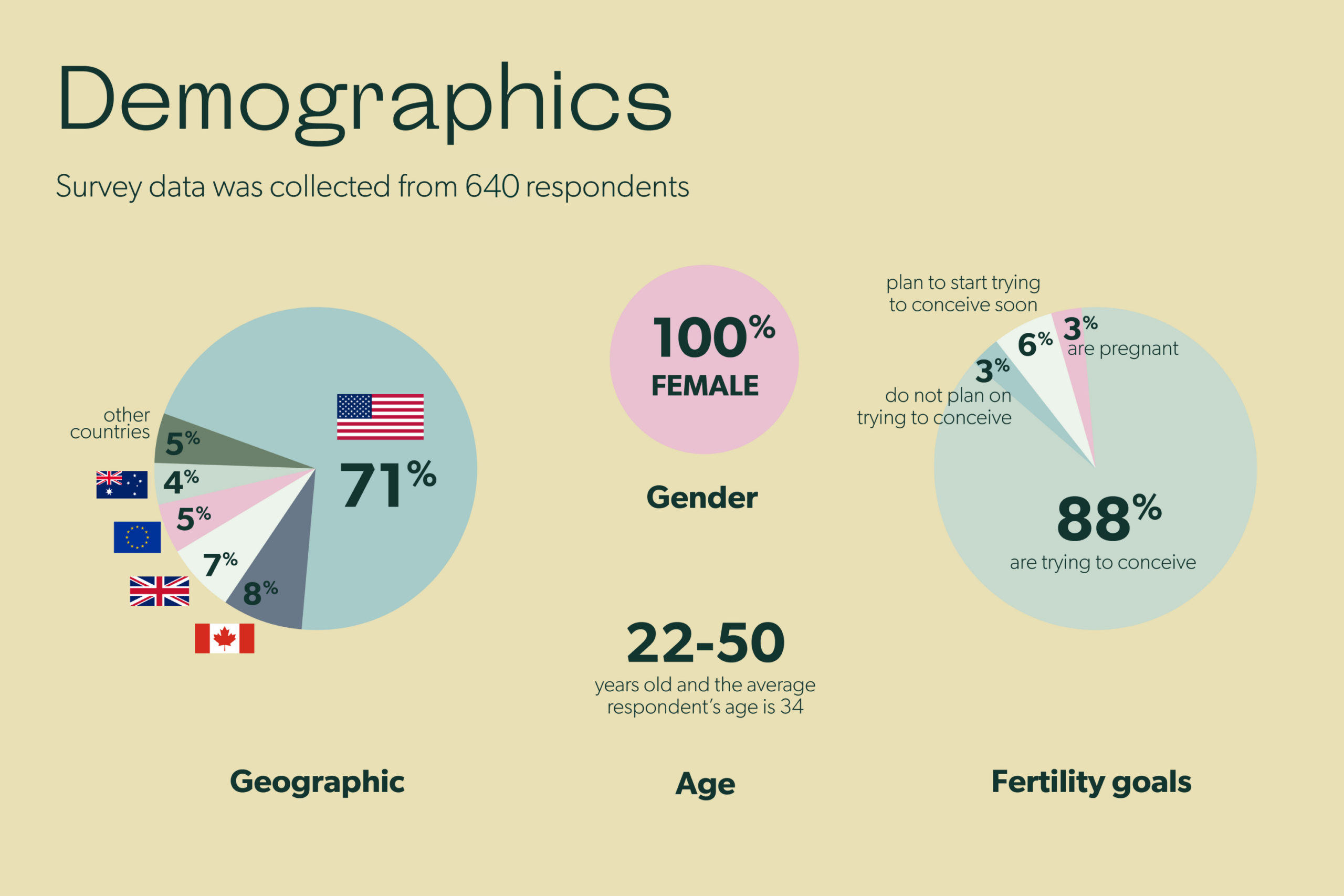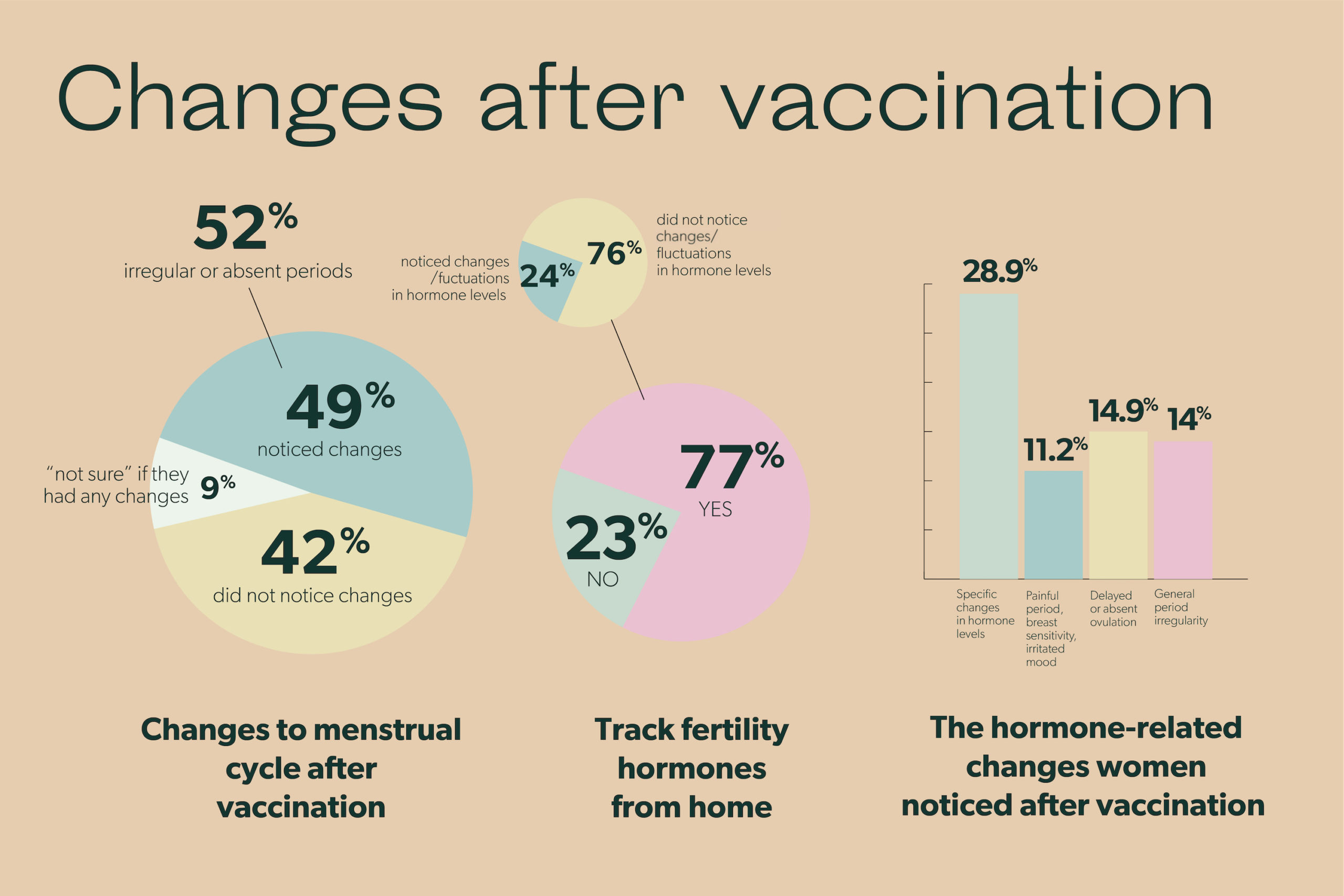49% of Women Noticed Changes in Their Menstrual Cycle After COVID-19 Vaccination, survey finds
Recently, Mira conducted a survey among women who got the COVID-19 vaccine to explore the potential impact of the vaccine on menstrual cycles.

The survey of 600+ Mira’s newsletter subscribers found that nearly half (49%) of respondents experienced noticeable changes to their menstrual cycle after having a COVID-19 vaccine. The most common disruptions included irregular or absent periods, abnormally heavy periods, longer periods, and more painful periods.
The findings in this survey support other reports from women across the world including the United States, Australia, United Kingdom, and France. In the light of the recent BMJ report suggesting that the link between period changes and COVID-19 vaccines is plausible and needs further investigation, we decided to look deeper into this topic.
It is important to note that all content regarding Mira’s survey is created and published online for informational purposes only. It is not intended to be a substitute for professional medical advice and should not be relied on as health or personal advice. Always seek the guidance of your doctor with any questions you may have regarding the COVID-19 vaccine.
Demographics of the Survey
In this survey among Mira’s newsletter subscribers, 640 women aged 22 to 50 years old were surveyed. Participants were from all over the world, including the US (71%), Canada (8%), United Kingdom (7%), European Union (5%), Australia (4%). The remaining 5% of participants were from countries outside of those mentioned above.

An overwhelming majority (88%) of participants were currently trying to conceive. 6% were planning to start trying to conceive within the next few years, 3% did not have plans to conceive in the near future, and 3% of participants were currently pregnant.
COVID-19 Diagnosis, Vaccination Status, and Awareness of Side Effects
Of the 640 participants, 89.5% had never been diagnosed with COVID-19, while 10.5% of respondents reported they had received a COVID-19 diagnosis. Only fully vaccinated respondents participated in the survey.

Of the respondents, (63.3%) had received the Pfizer-BioNTech vaccine, (27.5%) received the Moderna vaccine, (5.3%) received the Johnson & Johnson vaccine, (2.5%) received the Oxford/AstraZeneca vaccine, while the remaining respondents received the Sinopharm and Sinovac vaccines.
In terms of the respondents’ level of awareness regarding possible side effects of the COVID-19 vaccine, 79% expressed that they were aware of the side effects. 11% were not aware of the side effects, and 10% were not sure about the side effects.
Changes to Menstrual Cycle After Vaccination
Of the 640 respondents who received the vaccine, 49% claimed that they did notice changes in their menstrual cycle, while 42% of respondents did not. 9% of respondents expressed that they were “not sure” if they had experienced any changes to their menstrual cycle after getting the COVID-19 vaccine.
Of those who noticed changes to their menstrual cycle, the majority (52%) claimed to experience irregular or absent periods. Other common changes included (29%) abnormally heavy periods than normal, (24%) longer periods than usual, (21%) more painful periods than usual, (21%) lighter periods than normal, and (6%) easier periods than usual.

Fluctuations in Hormone Levels
77% of respondents use a hormone tracker like Mira to track and monitor their hormones at home. Of those who track their hormones regularly, the majority of respondents (76%) did not notice any changes or fluctuations in hormone levels after vaccinations.
However, there were 116 respondents (24%) who did notice changes. Specifically, there were reports of elevated levels of estrogen, lower levels of luteinizing hormone (LH), and general hormonal inconsistencies. Many respondents also struggled to confirm ovulation.

In addition to hormonal inconsistencies, respondents also reported a number of physical and emotional symptoms including irritability, mood swings, headaches, cramping, breast sensitivity, and acne.
Future Research is Needed
Data on menstruation was not collected or tracked in the COVID-19 vaccination trials. However, the CDC is reportedly looking into the issue going forward.
The New York Times also recently reported that researchers at Boston University, Harvard Medical School, Johns Hopkins University, Michigan State University, and Oregon Health and Science University will all be undertaking research to examine a potential connection between the COVID-19 vaccine and changes to the menstrual cycle.
If a connection is found, doctors and OBGYNs will be able to better advise patients on how the COVID-19 vaccine may cause disruptions to the menstrual cycle. This trusted information and advice will be invaluable to women who track their cycles regularly in order to conceive or avoid pregnancy.
No Link Between COVID-19 Vaccine and Infertility
It is important to note that there is no evidence that the COVID-19 vaccine can cause issues with fertility. In the event that there are disruptions to the menstrual cycle after receiving the COVID-19 vaccine, these disruptions are typically only short-lived and temporary.
If you are trying to conceive and are concerned about getting the COVID-19 vaccine, the CDC, American Society for Reproductive Medicine, and the American College of Obstetricians and Gynecologists have all affirmed that it is still safe for you to do so.
Mira’s Editorial Process
All content produced by Mira meets stringent editorial standards, ensuring excellence and accuracy in language and medical precision. Every piece undergoes thorough fact-checking and review by qualified professionals. Check out our full editorial process to learn more.




